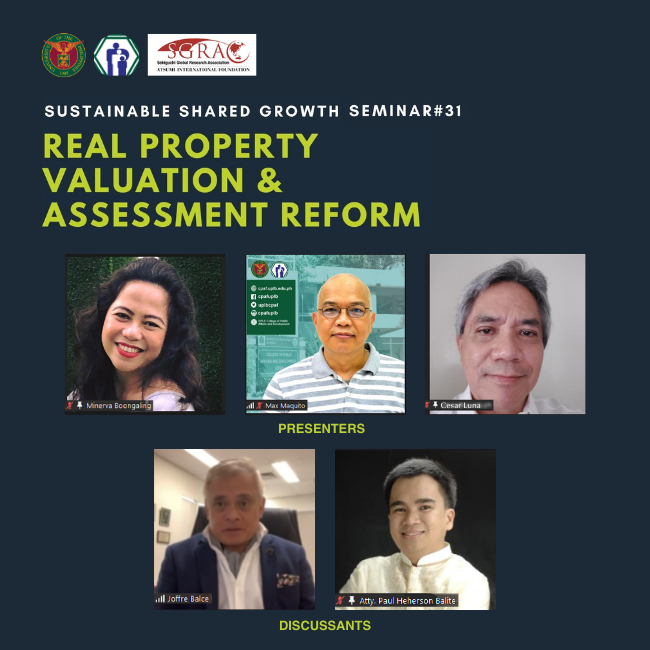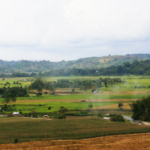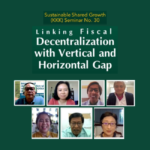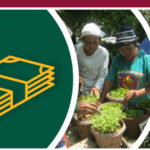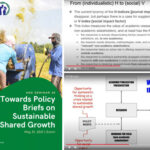Unlike other taxes, land valuation taxation (LVT) is efficient. It does not distort market prices. It
is the “least bad tax,” according to Milton Friedman, a staunch defender of market
fundamentalism. It is equitable as it is taxed only on unearned income. It is also environmentally
friendly or “eco,” as the Japanese nicely abbreviate, as it can limit urban sprawl.
LVT is not yet adopted in the Philippines. But the Real Property Valuation and Assessment Reform (RPVAR), which recently passed its 3rd reading in the Congress and has been forwarded to the Senate, is a step in the right direction.
In a paper that I, Minerva (Minnie) Boongaling, and Cesar Z. Luna submitted for the 6th Asia Future Conference, which will be held in Taiwan in 2022, we raised various issues in RPVAR along three perspectives: implementation, land valuation, and LVT. These issues include human and IT infrastructure constraints, proper valuation techniques, and the openness of the RPVAR to an LVT approach. Although we have identified these concerns, we concluded that RPVAR will help LGUs generate more internal revenues through the currently underdeveloped real property taxes as it depoliticizes real property taxation, encourages timely and accurate valuation, and paves the way for the adoption of an LVT.
The 31st Sustainable Shared Growth (KKK) Seminar held online on Dec. 2 had LVT in mind in relation to RPVAR. I and my co-authors shared our paper to participants coming from various institutions including local government units, academe, and civil society. The event was organized by the College of Public Affairs and Development (CPAf) and Sekiguchi Global Research Association (SGRA) of the Atsumi International Foundation (AISF).
Acting as seminar discussants, we had Joffre Balce, the secretary of the Association for Good Government (Australia); Atty Paul Balite, chief-of-staff of the Office of Representative Rudys Caesar G. Fariñas I, and Engr. Abet Arellano, provincial assessor of Laguna.
All three gave encouraging comments. Despite confirming the various constraints faced by Laguna, Engr. Arellano revealed that Laguna province was pushing forward with the computerization of its real property collection system, following the successful pilot study of the Laguna Municipality of Victoria. Joffre was delighted with our paper and agreed with the major points of the paper. Sharing his many insights from working in various committees in Congress, Atty. Balite encouraged us to submit our final paper to the House of Representatives Committee on Ways and Means and the Senate Committee on Finance.
The open forum reiterated and elaborated some points in our presentation and discussion that we can include in the final paper. First was on tax policy as an instrument for LGUs to attract outside resources. SGRA Chief Representative Junko Imanishi mentioned this case in other countries in her opening remarks. According to her, other countries compete for foreign investors and one way to do this is by offering tax breaks. A participant even mentioned the tax breaks on properties, but not on income, offered by the Philippine Export Processing Zone’s special economic zones. While pointing out that an LVT, especially its single tax version (where all taxes are just on land value), works in the opposite direction, the idea of LGUs competing among each other for outside resources in terms of their tax policies, would not be far-fetched.
Another point raised was the concern over urban sprawl and the conversion of farmlands to non-agriculture use. While there are mechanisms in place such as the Comprehensive Land Use Plan adopted by LGUs, the LVT also helps to contain urban sprawl by discouraging the holding of idle lands. This is essentially the mechanism by which LVT is eco, since urban containment leads to less encroachment on non-urban lands, affording more protection of the natural environment. This also suppresses land banking or land speculation, a problem that even Australia is facing now, according to Joffre. I also shared that Japan had a real property bubble in the 1980s, prompting the Japanese government to adopt an LVT in 1992. This was very effective in stabilizing the real property market. I suggested that it might be time again for Australia to take LVT more seriously, just as it did in the late 1800s.
Unlike many countries in Asia including Japan, Taiwan, South Korea, and Thailand, the Philippines does not have an LVT in the sense of a split-rate system, wherein a higher tax rate is imposed on land value than that imposed on improvements on land. This was very much clarified in the open forum in response to the point made that assessment of land value and improvements are done separately. One possible problem here, however, as pointed out by the Lincoln Institute of Land Policy, is that the application of a uniform tax rate may create incentives against undertaking separate assessments of land value and improvements. At any rate, the recommendation is that RPVAR keeps itself open to LGUs, on their own, adopting a LVT, just as the International Valuation Standards also does. In adopting an LVT, we recommend that LVT should be revenue neutral, meaning taxes before and after reform should be the same, and gradualist.
LVT has been part of my research and advocacy since 2015, when Joffre, who is my former colleague at the Center for Research and Communication, visited me in Japan while I was working at SGRA-AISF and Temple University Japan. He introduced me to Georgist views. I will not pretend to understand or align with all the tenets of Henry George, an American political economist whose book “Progress and Poverty: An Inquiry into the Cause of Industrial Depressions and of Increase of Want with Increase of Wealth: The Remedy” (1879), outsold the bestseller of late 19th century America: the Holy Bible. However, our discussions helped me understand how LVT could be a mechanism for achieving sustainable shared growth in the Philippines, an advocacy of SGRA.
At every opportunity, Joffre and I would include LVT in SGRA’s KKK seminar series. Surprisingly, we met resistance from other SGRA fellowship members when we started. They had difficulty grasping the significance of LVT. It was not until I came to UPLB in 2017 when the tide changed. I reconnected with my high school classmate, Cesar (Assistant Professor at UPOU and Program Chair of UPOU Land Valuation Management) and met Minnie (PhD student at CPAf and Treasurer of the Municipality of Pagsanjan). Unlike myself, Minnie and Cesar were more in touch with what was happening on the ground, and they were open to the idea of the LVT.
As we emphasized in our presentations, LVT is efficient, equitable, and environmentally friendly. It is aligned with the socio-economic goals of sustainable shared growth — KKK, which stands for Kahusayan (Efficiency), Katarungan (Equity), and Kalikasan (Environment). KKK is also the name of the revolutionary organization that fought for the independence of the Philippines from Spain. For the Philippines, therefore, KKK stands for what is noble in her traditions, and is very much against repression, albeit peacefully. We at SGRA feel that the Philippines is in dire need of sustainable shared growth and requires nothing short of a revolution in our ways of thinking and acting.
The author is an Assistant Professor at CPAf and former scholar of AISF.
Author profile
Ferdinand Maquito
Assistant Professor
at
CPAf
Related entries
-
Ferdinand Maquito#molongui-disabled-link
-
Ferdinand Maquito#molongui-disabled-link04 November 2021
-
Ferdinand Maquito#molongui-disabled-link14 October 2021
-
Ferdinand Maquito#molongui-disabled-link

